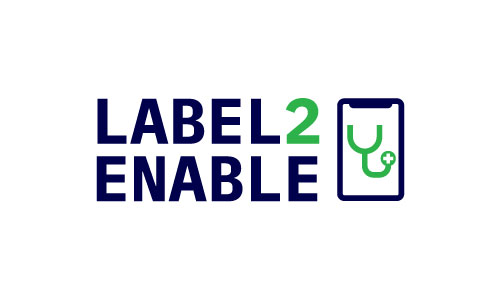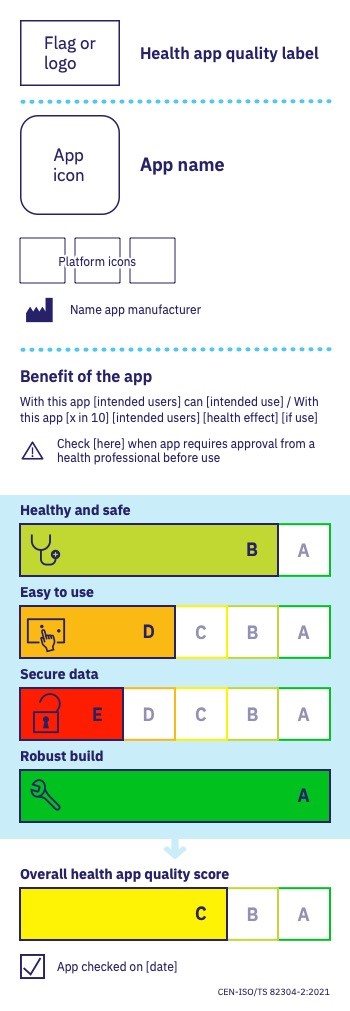Label2Enable; Horizon Europe maakt EU kwaliteitslabel voor gezondheidsapps mogelijk
1 juni, 2022

For English see below
Op 1 juni 2022 start Horizon Europe project ‘Label2Enable’. Veertien organisaties uit zeven landen (België, Duitsland, Italië, Kroatië, Litouwen, Nederland en Spanje) bundelen in dit project twee jaar hun krachten om het CEN-ISO/TS 82304-2 toetsingskader en label voor gezondheidsapps in Europa te promoten.
Vergrijzing en chronische ziekten drukken steeds zwaarder op zorgbudgetten in Europa. De kwaliteit en toegankelijkheid van de zorg is ongelijk en er is een toenemend tekort aan zorgprofessionals. Het besef groeit dat gezondheidsapps de zorg, zelfzorg en preventie kunnen versterken. Uit onderzoek blijkt bijvoorbeeld dat apps kunnen leiden tot een gezonder leefstijl, meer ziekte-inzicht, minder symptoomlast, minder ziekenhuisopnames, meer efficiency en zelfs langer leven. Het ontbreekt verwijzers en gebruikers nu echter aan informatie om de kwaliteit en betrouwbaarheid van gezondheidsapps te kunnen beoordelen. Dit belemmert het gebruik van apps. Voor makers van gezondheidsapps creëren de nu per land verschillende toetsingskaders en bijbehorende variatie in gevraagde bewijsvoering een ondoenlijke situatie.
In 2021 werd CEN-ISO/TS 82304-2health and wellness apps - quality and reliability’ gepubliceerd. Het Label2Enable project gebruikt CEN-ISO/TS 82304-2 en bijbehorend kwaliteitslabel om de impasse te doorbreken en breed gebruik en aanbod van kwalitatieve gezondheidsapps te stimuleren. Het doel van Label2Enable is drieledig: het realiseren van vertrouwen, gebruik en adoptie.
Vertrouwen
Consortiumpartners i-HD, ORCHA, HIMSS, EIT Health en COCIR werken samen in de pijler Vertrouwen. Zij maken en toetsen het CEN-ISO/TS 82304-2 handboek voor toetsorganisaties, in ISO-termen een ISO/IEC 17065 certificatieschema. Ze zorgen dat het handboek passende toetsmethodes bevat, aansluit bij EU-wetgeving en -waarden, bij verschillende toetsorganisaties tot dezelfde consistente resultaten leidt, en ook voor appmakers werkt. Ze borgen dat ook na het project het handboek wordt onderhouden en toetsorganisaties kunnen worden geaccrediteerd. Verder onderzoeken ze of wetgeving rondom het label raadzaam is en wie betaalt voor de toets.
Gebruik
Consortiumpartners European Patients Forum, Kaunas Clinics, LUMC, EuroHealthNet en de Universiteit van Amsterdam werken samen in de pijler Gebruik. Zij onderzoeken wie consumenten het meest vertrouwen als het gaat om adviezen over gezondheidsapps en wat ook mensen met lage gezondheidsvaardigheden helpt om het kwaliteitslabel te gebruiken. Ze vinden uit wat zorgprofessionals nodig hebben in het gedetailleerder apprapport om gezondheidsapps aan te raden en hoe het label effectief in app stores, appbibliotheken en vertrouwde bronnen als Thuisarts.nl kan worden weergegeven.
Adoptie
Consortiumpartners Empirica, i-HD, LUMC, ISS, Fundacio TIC Salut en Tatjana Prenda Trupec werken in de pijler Adoptie aan de promotie van CEN-ISO/TS 82304-2. Ze betrekken stakeholders via diverse kanalen. Met ‘use stories’ van pilots met CEN-ISO/TS 82304-2 in Italië, Catalonië en Nederland maken ze inzichtelijk hoe het ISO toetsingskader effectief kan worden geïmplementeerd. Verder onderzoeken ze met zorgverzekeraars en zorgautoriteiten hoe het ISO toetsingskader kan helpen in besluitvorming over vergoeding van gezondheidsapps.
Petra Hoogendoorn zal Label2Enable vanuit het National eHealth Living Lab, LUMC, afdeling Public Health en Eerstelijns Geneeskunde coördineren.
Voor nadere informatie Romy Willemsen R.F.willemsen@lumc.nl

On June 1, 2022, Horizon Europe project 'Label2Enable' will start. Fourteen organizations from seven countries (Belgium, Croatia, Germany, Italy, Lithuania, the Netherlands, and Spain) will join forces for two years to promote the CEN-ISO/TS 82304-2 health app assessment framework and label in Europe.
An ageing population and chronic diseases are putting more and more pressure on health budgets in Europe. The quality and accessibility of healthcare services are unequal, and the shortage of healthcare professionals increases. There is a growing recognition that health apps can strengthen healthcare, self-management, and prevention. Research shows, for example, that apps embedded in care can promote a healthier lifestyle, provide more disease insight, less symptom burden, less hospital admissions, more efficiency and even a longer lifetime. However, referrers and users
currently lack information they need to determine the quality and reliability of health apps. This is a barrier to the use of apps. App manufacturers experience the varying national approval processes as confusing and unclear as to what is expected and the depth of evidence that is required by each approval body.
In 2021 ,CEN-ISO/TS 82304-2- health and wellness apps - quality and reliability' was published. The Label2Enable project uses the golden opportunity of CEN-ISO/TS 82304-2 and its health app quality label to break through the impasse and promote broad use and ditto supply of quality health apps. The
objective of Label2Enable is threefold: to achieve trust, use and adoption.
Trust
Consortium partners i-HD, ORCHA, HIMSS, EIT Health and COCIR cooperate in the pillar Trust. They will create and test the CEN-ISO/TS 82304-2 handbook for accredited health app assessment organizations, in ISO terminology an ISO/IEC 17065 certification scheme. They will ensure that the
handbook contains appropriate assessment methodologies, aligns with EU legislation and values, produces the same consistent results regardless of the assessment organization involved, and works as well for app manufacturers. They will secure maintenance of the handbook after the project and
enable accreditation of assessment organizations. They will also investigate if legislation for the label is sensible and who is to pay for the assessment.
Use
Consortium partners European Patients Forum, Kaunas Clinics, LUMC, EuroHealthNet and the University of Amsterdam cooperates in the pillar Use. They will investigate who consumers trust most to give them recommendations on health apps and what will also help people with low health
literacy to use the quality label. They will find out what healthcare professionals need in the detailed app report to be able to recommend health apps and how to display the label effectively in app stores, app libraries and trusted sources.
Adopt
Consortium partners Empirica, i-HD, LUMC, ISS, Fundacio TIC Salut and Tatjana Prenda Trupec cooperate in the pillar Adopt to promote CEN-ISO/TS 82304-2. They will involve stakeholders through various channels. With 'use stories' of pilots with CEN-ISO/TS 82304-2 in Italy, Catalonia, and the The Netherlands, they will provide insights on how to implement the ISO assessment framework effectively. Finally, they will explore with health insurers and health technology assessment bodies how the ISO assessment framework can help in decision-making on reimbursement of health apps.
Petra Hoogendoorn will coordinate Label2Enable from the National eHealth Living Lab, Leiden University Medical Center the Netherlands, Department of Public Health and Primary Care.
For more information contact: Romy Willemsen: R.F.Willemsen@lumc.nl
Links
Vanaf september: www.Label2Enable.eu
